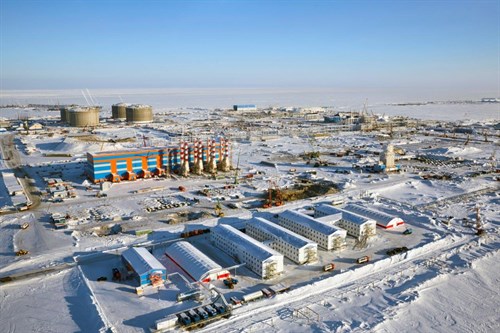Salzgitter seeks exemption from national gas rationing
(Reuters) - Salzgitter AG, Germany's second-largest steelmaker, is in talks with regulators in a bid to secure exemption from potential gas rationing, saying its production was vital for Germany's broader energy security plans and local city heating.
Salzgitter is one of several major companies seeking exemption from any rationing should there be a further reduction in gas supply from Russia, which is now delivering just a fifth of agreed volumes via the Nord Stream 1 pipeline.
Salzgitter makes the pipes needed to connect two planned LNG terminals with the national grid, giving the group a key role in Germany's efforts to reduce reliance on Russian energy.

"We are thus part of the solution to the question of greater energy independence," Salzgitter Chief Executive Gunnar Groebler told Reuters.
Asked if Salzgitter might have to halt operations, the CEO who took charge last year said: "We've been getting the question again and again: What will happen if Salzgitter is completely shut down? I would say that this is relatively unlikely."
Groebler, a former executive at Swedish power utility Vattenfall, said his company was also a district heating supplier to the city of Salzgitter, giving it a prominent role in local energy supply.
Heat generated by the company's production processes are fed back into the district heating system, which Groebler said could be affected if production was halted: "That's about 100,000 residents who would then have no hot water and no heating."
Salzgitter is also the third-largest supplier of drinking water in the German state of Lower Saxony where it is based and which holds a 26.5% stake in the steelmaker, Groebler said, adding to knock-on challenges if Salzgitter had to shut down.
Germany is now at phase two of a three-stage emergency plan that envisages gas rationing in the final stage. Industry consumes about a quarter of gas used in Germany.
Groebler, 50, said Salzgitter was in talks with Germany's network regulator, which would be in charge of rationing, and was discussing the issue with the Federal Network Agency, which has sent questionnaires to industry about their usage.
Salzgitter is a member of the German Steel Federation, which is also talking to the regulator.
Groebler said Salzgitter reduced energy consumption by more than 20% compared to last year, partly because of lower steel demand expected in the second half of the year.
Only three of four heating furnaces for the hot strip mill in Salzgitter were in operation, he said, adding: "This is economically driven ... but of course it is also our contribution to the current savings discussion."
(Reporting by Christoph Steitz; Editing by Edmund Blair)

- TotalEnergies and Mozambique announce the full restart of the $20-B Mozambique LNG project
- RWE strengthens partnerships with ADNOC and Masdar to enhance energy security in Germany and Europe
- Five energy market trends to track in 2026, the year of the glut
- Venture Global wins LNG arbitration case brought by Spain's Repsol
- Trinity Gas Storage reaches FID on Phase II expansion



Comments